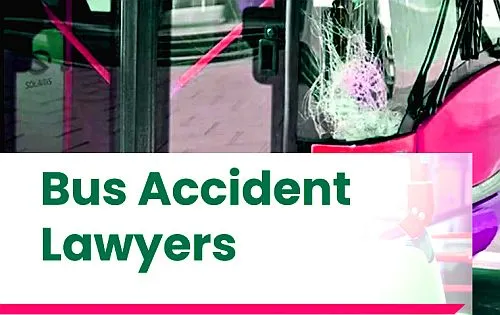Bus Accident Lawyer
Bus Accident Lawyer advocate for individuals who have sustained injuries in bus accidents, including passengers and other victims. Gain insights into various categories of bus accidents, standard carrier regulations, legal actions about government-operated buses, and the necessity of engaging legal representation.
Bus Accident Lawyer | Top-Rated Bus Injury Attorney
Numerous bus accidents occur across the United States every year. These incidents involve a variety of buses navigating the roadways, from intercity buses and tour buses to long-distance coaches and school buses.
Due to their purpose of transporting large numbers of passengers, buses are engineered with safety as a priority. As a result, most bus journeys conclude with passengers safely disembarking at their intended destination.
Auto Insurance
Nevertheless, bus accidents can have devastating consequences. Such incidents may involve numerous individuals and multiple vehicles and pose risks to those outside the bus, including pedestrians, cyclists, and exiting passengers.
Suppose you’ve sustained injuries in a Bus Accident Lawyer caused by another vehicle. In that case, you can pursue a personal injury claim through the at-fault driver’s auto insurance, much like in a standard car accident case. However, the viability of a bus accident lawsuit varies based on the specific details of the incident and the type of bus implicated.
Types Of Bus Accidents
Suppose you’ve been injured in a Bus Accident Lawyer and intend to pursue a personal injury claim. In that case, the legal procedures may diverge based on the bus ownership implicated in the incident.
City/Regional Bus Accidents
Every day, intercity and regional public buses transport millions of passengers. These buses are typically operated by city and state agencies, subject to specific laws governing the process for filing legal claims. Alternatively, city or regional buses might be operated by private companies, potentially altering the trajectory of an injury claim.
School Bus Accidents
School buses are meticulously designed to prioritize safety and minimize the risk of student accidents. Legal proceedings for school bus accidents often mirror those involving public city buses. If a public school district owns the bus, the injured party typically pursues a claim against a public entity.
Long-Distance Bus Accidents
Numerous long-distance buses, such as those operated by Greyhound, are owned and managed by private companies. As these companies specialize in passenger transportation, they fall under the legal category of common carriers. Consequently, they bear the legal obligation to exercise a duty of care to ensure the safety of their passengers.
In bus accidents involving private carriers like Greyhound, individuals injured in such incidents can pursue a personal injury lawsuit to seek compensation.
Readmore Construction Truck Accident Lawyer June 2024
Tour Bus Accidents
Like Greyhound buses, private companies own and manage tour buses that fall under the standard carrier classification. However, determining liability can be more intricate in these situations.
Several parties may bear responsibility for negligence if they contributed to the accident, including:
- The individual driver.
- The tour bus company.
- The tour company (if distinct from the bus company).
- Business owners at various stops or destinations on the tour.
Common Causes Of Bus Accidents
Bus accidents can occur unexpectedly and stem from diverse causes. Many incidents involve collisions with stationary objects or other vehicles on the road.
Some typical reasons for bus accidents include:
- Driver distraction or error.
- Driver fatigue.
- Aggressive driving or speeding.
- Issues with passengers.
- Poor road conditions or visibility challenges.
- Alcohol or drug impairment.
- Equipment malfunction.
- Challenges with maneuvering in urban areas.
Common Carrier Laws And Bus Accident Lawyer
Buses serve as a crucial means of public transportation, facilitating travel to work, school, shopping, medical appointments, and various other destinations. Legally, any individual or entity transporting passengers for a fee is categorized as a common carrier.
Both state and federal governments oversee common carrier laws, which mandate stringent standards for passenger safety. These regulations aim to uphold high safety for individuals utilizing transportation services.
As a result of these regulations, common carriers undertake various measures to safeguard the well-being of their passengers, such as:
- Providing safe entry and exit points for passengers.
- Implementing security measures to protect passenger health and safety.
- Thoroughly screening, hiring, and training competent drivers.
- Conducting regular maintenance checks on buses.
- Addressing and monitoring any design flaws present in the bus.
Negligence In Common Carrier Bus Accident Lawyer
When a bus company breaches its obligation to ensure passenger safety, it may constitute negligence. Negligence occurs when the bus driver or company acts carelessly or unreasonably, failing to uphold the safety of bus riders.
Instances of negligence in bus accidents may involve:
- Employing unqualified or inadequately trained bus drivers.
- Operating the bus while the driver is under the influence of alcohol or drugs.
- Requiring the driver to work excessively long hours leads to fatigue or insufficient rest.
- Refrain from proper maintenance of bus equipment.
- Overloading the bus beyond its capacity.
What To Do After A Bus Accident Lawyer To Help Your Injury Claim
To succeed in a Bus Accident Lawyer lawsuit, your attorney may need to demonstrate that the negligence of the bus driver or transportation company directly resulted in your injuries.
Following the accident, gathering ample evidence to support your case is vital.
Evidence that could assist your lawyer in establishing negligence in a Bus Accident Lawyer lawsuit comprises:
- Photographs capturing your injuries immediately following the incident.
- Statements or testimonies from witnesses.
- Incident reports or police reports.
- Records detailing the date, time, and weather conditions at the time of the accident.
- Your firsthand recollection of the accident and the severity of your injuries.
- Medical documentation, including records and bills.
- Receipts or documentation validating out-of-pocket expenses.
- Correspondence from your employer regarding lost wages or inability to work.
